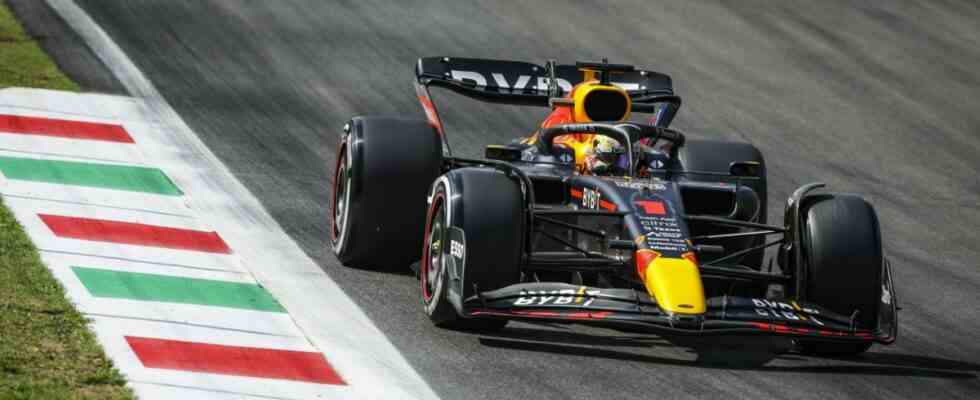An engine had not yet been built, but the campaign with which Porsche wanted to prepare the ground for its entry into Formula 1 was already in full swing. A series of ads in manager magazine recently moved over several pages in the highest speed range of marketing poetry. “Dreams have shaped us” and “Sport has shaped us” led to the declaration of intent: “We are sportmade.”
The sports car manufacturer from Zuffenhausen now has to look for another platform for this attitude (and its drive unit). Before the Italian Grand Prix, the company announced succinctly that the apparently secure partnership between Porsche AG and Red Bull would not come about. It remained unclear whether the beverage company let the car company rebuff – or Porsche pulled the ripcord. Both are probably correct: it’s all a question of power.
The verbal preparatory work for the bursting of the dream marriage had been done a week ago by Red Bull team boss Christian Horner and consultant Helmut Marko. “We are an independent racing team and have always operated in this way in order to work flexibly and quickly and efficiently.” This love of freedom also conceals the fact that the previous gentlemen in the house still want to be in charge. Porsche’s CEO Oliver Blume, recently promoted to Volkswagen Group leader, also stands for self-confidence and independence, the role as a passenger does not correspond to the self-image. Apparently two too strong partners collided. So there was an exit before the entry.
Team boss Horner and consultant Marko are said to have stormed against Porsche having a say in all areas
Porsche, which is on the verge of an IPO worth billions, did not even hide its annoyance in its statement: “The premise was always a partnership at eye level, which in addition to an engine partnership also includes the team. This could not be realized.” What a beautiful red-white-red story that should have been, once negotiated between the Austrian owner families Porsche and Piëch and the Red Bull founder Dietrich Mateschitz: on the one hand the most successful racing team after Mercedes in the younger Grand Prix History, on the other the engine power from Zuffenhausen.
The gentlemen like to call the shots: Red Bull team boss Christian Horner (left) and racing team advisor Helmut Marko.
(Photo: Mark Thompson/Getty)
The marriage was originally supposed to be announced at the Austrian Grand Prix in July. A joint company had already been founded in Morocco, ownership was split fifty-fifty, and the antitrust authorities were informed. However, this division caused astonishment both internally and externally.
Horner and Marko in particular are said to have been up in arms about the fact that Porsche was striving for so much say in all areas, right down to driver selection. Apparently even Mateschitz’s Thai business partners were involved in order to prevent the threat of paternalism. The weeks of renegotiation had already given the brand an impression of how difficult business with the British-run racing team would be. Obviously, Porsche did not want to get involved in another poker game for shares.
Porsche also did not want to accept a minority interest, for example only in the engine department of Red Bull. Critical voices had already been raised at home as to why only the e-components and not the entire unit should come from Zuffenhausen (Formula 1 is about to change the regulations towards, among other things, 50 percent electric content). After all, Porsche temporarily dominated Formula 1 with its turbo in the 1980s.
Porsche’s marketing experts had already secured the trademark rights to the term “F1nally” for their campaign
The marriage between Red Bull and Porsche only came up for discussion because the drinks company’s racing team has regularly built aerodynamically outstanding cars, but at the same time had to beg for strong drive partners. Ferrari, Mercedes and Renault had no interest in equipping the competition with rental engines. When Honda announced its exit after years together, Red Bull acquired know-how and naming rights and began building an engine campus in Milton Keynes. At the same time, it poached leading engineers from other teams. In the meantime, the 300 employees are said to have already put a prototype to the test according to the new technical rules, to which Porsche could have added the electric component.
In the rivalry between top managers, Audi boss Markus Duesmann wiped out his boss and competitor Oliver Blume (pictured) by entering Formula 1 two weeks ago.
(Photo: Sven Hoppe/dpa)
For Porsche, this new design, which Formula 1 will miss in the future, basically fits perfectly into its portfolio. The series had recently also explicitly accommodated possible newcomers, one would like to do something for the image. Porsche’s marketing experts had meanwhile secured the trademark rights to the term “F1nally”, a play on words intended to celebrate the return to the pinnacle of motorsport. The only point of contention within the Volkswagen consortium was that sister company Audi was also pushing into Formula 1. The two companies had already fought an expensive competition in the Le Mans racing series. The Ingolstadt-based company, who officially committed to Formula 1 two weeks ago, are currently planning to take over a racing team, presumably the Swiss Sauber team. In the rivalry between top managers, Audi boss Markus Duesmann has wiped out his boss and competitor Blume for the time being.
The Porsche dream is not quite over yet, as a company spokesman confirms: “With the changes to the regulations that have been decided, the racing series remains an attractive environment for Porsche, which will continue to be monitored.” You might find a new partner. One candidate would be McLaren, where Andreas Seidl, a former Porsche man, is the boss of the racing team; Audi also recently negotiated with McLaren. A sponsorship agreement, such as that currently maintained by Alfa Romeo with Sauber, would also be conceivable. But Porsche would probably prefer to take a really sporty approach.

